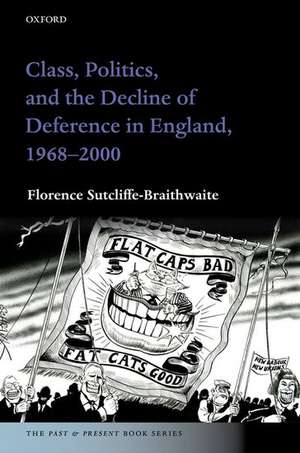Class, Politics, and the Decline of Deference in England, 1968-2000: The Past and Present Book Series
Autor Florence Sutcliffe-Braithwaiteen Limba Engleză Hardback – 8 mar 2018
Din seria The Past and Present Book Series
- 30%
 Preț: 601.95 lei
Preț: 601.95 lei - 18%
 Preț: 168.33 lei
Preț: 168.33 lei - 17%
 Preț: 197.62 lei
Preț: 197.62 lei - 13%
 Preț: 193.11 lei
Preț: 193.11 lei - 12%
 Preț: 193.18 lei
Preț: 193.18 lei - 14%
 Preț: 185.87 lei
Preț: 185.87 lei - 13%
 Preț: 192.68 lei
Preț: 192.68 lei - 25%
 Preț: 521.29 lei
Preț: 521.29 lei - 25%
 Preț: 522.88 lei
Preț: 522.88 lei - 11%
 Preț: 198.24 lei
Preț: 198.24 lei - 18%
 Preț: 193.07 lei
Preț: 193.07 lei - 13%
 Preț: 192.89 lei
Preț: 192.89 lei - 24%
 Preț: 474.14 lei
Preț: 474.14 lei - 12%
 Preț: 310.43 lei
Preț: 310.43 lei -
 Preț: 231.42 lei
Preț: 231.42 lei - 13%
 Preț: 275.25 lei
Preț: 275.25 lei - 16%
 Preț: 268.72 lei
Preț: 268.72 lei - 26%
 Preț: 546.29 lei
Preț: 546.29 lei - 30%
 Preț: 725.10 lei
Preț: 725.10 lei - 15%
 Preț: 558.24 lei
Preț: 558.24 lei - 11%
 Preț: 239.22 lei
Preț: 239.22 lei - 30%
 Preț: 486.62 lei
Preț: 486.62 lei
Preț: 575.78 lei
Preț vechi: 782.69 lei
-26% Nou
Puncte Express: 864
Preț estimativ în valută:
110.19€ • 119.65$ • 92.56£
110.19€ • 119.65$ • 92.56£
Carte tipărită la comandă
Livrare economică 12-18 aprilie
Preluare comenzi: 021 569.72.76
Specificații
ISBN-13: 9780198812579
ISBN-10: 0198812574
Pagini: 262
Ilustrații: 13 black and white images and tables
Dimensiuni: 163 x 242 x 23 mm
Greutate: 0.56 kg
Editura: OUP OXFORD
Colecția OUP Oxford
Seria The Past and Present Book Series
Locul publicării:Oxford, United Kingdom
ISBN-10: 0198812574
Pagini: 262
Ilustrații: 13 black and white images and tables
Dimensiuni: 163 x 242 x 23 mm
Greutate: 0.56 kg
Editura: OUP OXFORD
Colecția OUP Oxford
Seria The Past and Present Book Series
Locul publicării:Oxford, United Kingdom
Recenzii
[T]his very interesting study attempts to answer the questions, Why Thatcher? Why Blair? That is, how and why did the traditional class and political alignments of Labour and Conservative voters fracture and realign themselves during the last third of the twentieth century? To analyze these fundamental shifts in political attitudes and class identifications, Sutcliffe-Braithwaite revisits previous sociological studies, oral histories, mass observation records, and related materials to reconstruct how popular languages of class and society changed during this period. Summing Up: Recommended.
The result is not only a major contribution to understandings of class, popular identity and political change in the last third of Britain's twentieth century, but also a model of the virtues of qualitative analysis for sociology and politics, no less than for history ... Class, Politics, and the Decline of Deference in England successfully shows that class became obscured as a category of popular identification during the late twentieth century; draws upon those findings to reframe the political successes of Thatcherism and New Labour; and -- most ambitiously -- offers a compelling explanation of the complex relationship between social experience, popular perception and political change.
The result is not only a major contribution to understandings of class, popular identity and political change in the last third of Britain's twentieth century, but also a model of the virtues of qualitative analysis for sociology and politics, no less than for history ... Class, Politics, and the Decline of Deference in England successfully shows that class became obscured as a category of popular identification during the late twentieth century; draws upon those findings to reframe the political successes of Thatcherism and New Labour; and -- most ambitiously -- offers a compelling explanation of the complex relationship between social experience, popular perception and political change.
Notă biografică
Florence Sutcliffe-Braithwaite did her undergraduate degree in history at St Hugh's College, Oxford, and her MPhil and PhD at St Catharine's Collage, Cambridge, supervised by Jon Lawrence. She was subsequently a Junior Research Fellow at Clare College, Cambridge before moving to UCL where she lectures in Twentieth-Century British History. She is also an interviewer for the History of Parliament Trust's oral history project, and co-editor of Renewal: a journal of social democracy.
